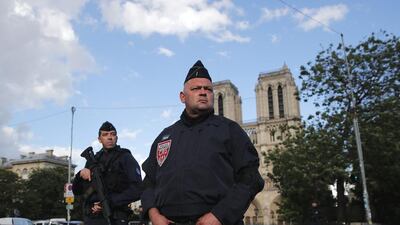Almost lost amid all that has happened in London and concerning Qatar, there was encouraging news from Paris on the international struggle to counter terrorism.
On a purely human level, it was a merciful outcome of the attack outside Notre Dame, a powerful magnet for tourists whether or not they are also devout Christians, that only one person other than the assailant was hurt.
The casualty, a policeman aged 22 and one of three officers approached from behind, suffered only minor injuries to his neck when struck with a hammer. His attacker was also carrying two kitchen knives, so the consequences could easily have been fatal.
And in terms of the need to penetrate the minds and methodology of extremism, the fact that the suspect was detained and not killed was also to be welcomed.
The fate, and often the desire, of terrorists is to die while inflicting bloodshed on others. It allows them to apply a thin veneer of selflessness to wicked actions, and they have been persuaded in any case that special rewards await them in the after-life.
The shoot-to-kill tactics of security forces, whether in Europe or the United States or indeed the Middle East, are readily understood and wholly justifiable.
Confronted by monstrous knife-wielding murderers near London Bridge, canisters strapped to their bodies, police had every reason to believe they might cause further misery by detonating suicide bombs.
It would have useful, for investigatory purposes, to interrogate one of more of them. Were they simply inspired by ISIL exhortations to butcher ordinary citizens offering no threat to anyone or any culture, simply people enjoying a Saturday night out? Or was there a chain of command that organised, facilitated or directed their attack? But since all are dead, we may never know. So it felt initially comforting to know that the captured Notre Dame attacker, named by French media as Algerian-born Farid Ikken, could be questioned in great depth, once well enough, having been shot and slightly wounded after launching his assault, about his own network of contacts and what led him to record a video professing allegiance to ISIL.
Unfortunately, that may well prove a false hope. Ikken turns out to be a somewhat mature student of 40, a man whose university supervisor had heard him utter only warm words about the West and, almost certainly, one who acted alone.
That must be a source of disappointment to French investigators. It would even have been useful to know how an educated man seriously believed attacking a policeman outside a cathedral was “for Syria”, where his beloved ISIL’s cruelty has known no bounds. In the event, he may simply have been deranged.
It does not take much imagination to work out the potential importance of what might have been gleaned from terrorists denied the right to die along with their innocent prey in London, Manchester, Paris, Brussels and many other locations, plenty of them in the Middle East.
Police responding to such events necessarily put caution first. Indeed, senior officers familiar with armed response used to argue that shooting to wound was the stuff of American western films, not real policing which required the attacker to be “stopped”, invariably translated as killed.
But advancing technology, including the use of stun guns and Tasers, at least allows the philosophy to be refined where circumstances permit.
In the collective war against terrorism, in which the UAE is an obvious force, there are many compelling features.One of these is surely that the more killers and would-killers can be taken alive, the greater the chances of preventing at least some future atrocities.
Colin Randall is a former executive editor of The National


